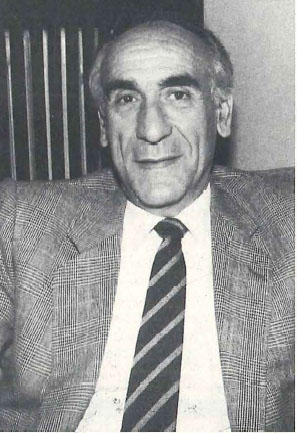
Bartholomew: In the view of reduced threat from the USSR and the Warsaw Pact countries how do you see the future of NATO?
Papadongonas: The radical changes now taking place in central and eastern Europe influence NATO itself. The changes in Moscow and the Warsaw Pact are not going to terminate the NATO alliance. It is changing but we don’t know what the future will be. There are Jots of questions. NATO is in a period of ‘wait and see’. Everyday there is something new. The Gulf crisis: what can NATO do there? It does not have the authority to act in that region. Europe should be satisfied with the NATO alliance. After all, for 41 years it has been the guarantee for peace on the continent. The US is not going to abandon its alliances or obligations overseas, especially in defense of Europe.
Bartholomew: How have the changes in eastern Europe affected the overall strategy of Greece?
Papadongonas: Greece has a very special geopolitical position. Historically, we are a focus for wars and a joining point of three continents. During different periods of our history we have been surrounded by friends and enemies. Greece is a peace loving cuuntry, but unlike countries like Holland or Belgium in the middle of Europe, we cannot reduce our armed forces. There is no threat now from the Soviet Union, but for us it is really very difficult as we have a certain uneasiness particularly concerning the stability of the new east European regimes. Will they remain unified or break up into component parts? We hope they remain unified and friendly countries. The same thing is true of Albania which is also a question mark for us.
Bartholomew: From where do you see the greatest ‘threat’?
Papadongonas: Within NATO we don’t use the word ‘threat’ any more. We call it ‘risk’. As far as Greece is concerned it is well known that we have certain differences with Turkey but we both belong to NATO. The foreign policy of Greece is based on the use of peaceful means in solving problems; that is, peaceful negotiations should be conducted over areas that can be solved. Also another point which is very important for Greece is to solve the problem of Cyprus in line with United Nations’ resolutions. For example, 40 percent of Cyprus is occupied by foreign troops. Although Cyprus is an independent country and member of the UN there are thousands of refugees swept from their homes in the North. Cyprus is a small country (like Kuwait) attacked and occupied (in part) by a foreign power. Greece would expect the international community to show the same sensitivity for Cyprus with that already shown to Kuwait.
Bartholomew: Will the Greek forces be reduced or increased?
Papadongonas: For Greek defense forces it is not a very easy decision to take. Unfortunately almost·seven percent of our Gross National Product is spent on defense (the largest proportion in NATO). Nobody wants this; we would prefer to spend our money on more productive areas such_ as education, social benefits, roads, communications for the benefit of our people. But, unfortunately, it is difficult for us to reduce it now and any power reduction today should be replaced by modern equipment in order to maintain the effectiveness of our armed forces to the desired level.
Bartholomew: What types of weapons or systems are you looking for under the Southern Region Amendment to the US Foreign Assistance Act to upgrade the NATO complement of the Greek military forces?
Papadongonas: In major equipment we will be looking for A4 planes for the airforce and M60 tanks for the army.
Bartholomew: What weapons are presently on order?
Papadongonas: We have bought four frigates MEKO-200, the first of which is being built in Germany; the other three will be built here in the shipyards of Skaramanga. On top of these, we are planning also to build patrol boats and LSTs (tank landing ships) in Greece. We will be modernizing our submarine and modifying our M48 tanks. We are interested in obtaining attack helicopters and will be modifying the Chinook helicopters already in our arsenal. We intend to purchase 155mm self-propelled guns and already have offers from several countries including Holland, US and the UK. Ground-to-air electronic communications Will be brought up to present state of the art. Simulators for tanks and aircraft will be upgraded to meet the needs of modern technology.
Bartholomew: What other items will be manufactured in Greece?
Papadongonas: Hellenic Aerospace Industries (HAI) is seeking more cooperation with foreign companies for co-production of both military and civilian aircraft. Under offset programs it is already making parts for the F16 and Mirage 2000 fighters. We participate in the European consortium for the STINGER missile. HAI has years of experience in the servicing of C130 transports and is actively looking for future contracts. There is also an interesting Soviet proposal covering repair and maintenance of commercial aircraft. Bartholomew: And apart from the aerospace industry?
Papadongonas: We have of course a sophisticated industry for small arms, ammunition, armored personnel carrier (LEONIDAS), trucks ,etc. These factories, mainly government owned, supply our defense forces (their largest customer) and, to a small extent, export to third world countries.
Bartholomew: Has Greece received delivery of all the F16s and Mirage 2000s on order?
Papadongonas: The previous PASOK government ordered 40 of each, of which all the F16s and 28 Mirage 2000 have been delivered. We have a small problem with the Mirage radar on the remaining 12 planes which, I am sure, will be solved shortly.
Bartholomew: What is the present price of the two planes?
Papadongonas: The Mirage 2000 costs 41 million US dollars and the F16, 23 million US dollars.
Bartholomew: Thank you Mr Minister.







